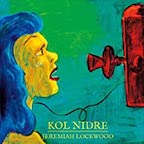Jeremiah Lockwood / Kol Nidre

Jeremiah Lockwood / Kol Nidre, 2016
Available as digital download from iTunes, Amazon, and other fine vendors.
This recording is five years old and Lockwood has moved on to newer projects, but it is the High Holiday season and, once again, I have pulled it off the shelf and find myself listening. The recording opens with a bluesy, slide guitar instrumental of the main theme. Throughout it reflects Lockwood's legacy as the grandson of a renowned cantor, but also his years as a street blues musician and leader of the "punk-cantorial" band (my label, not theirs), The Sway Machinery. The recording reflects what was then the fifth year (he's now on his 10th) of providing music at services held with Rabbi Dan Ain in Brooklyn, NY.
Lockwood wrote me at the time,
"The Kol Nidre prayer text contains nothing but enigmas—it is a fairly dry legalistic text that has been transformed over the centuries in popular perception and has come to be looked at as soul-drenched poetry. It’s purpose is to ring tears from the eyes of the people as they contemplate their mortality. The famous Kol Nidre melody is considered one of the oldest in the cantorial music canon, dating to the Middle Ages, and yet it’s melody plainly bears the mark of “modern” European classical music influence, attesting to the endless changes that Jewish sacred music is constantly undergoing. On my new record I try to take all of these paradoxes into account, drawing from the arcane and the earthy, the folkloric and the modernist, to make something that holds true to the beautiful shape-shifting of the cantorial music tradition."
What I love most about this album is how Lockwood, one of the most exciting innovators creating new Jewish music today, fuses his contemporary American influences with khazones. In this most sacred of Jewish prayer cycles, he ranges from the more traditional "Kol Nidre" or "Kedusha" to the the folky-blues-inflected "Everybody's got to be tried," the blues-phrased "m'khaye meysim" ("Revive the Dead"), or the African-griot-music-invoking guitar of "Birkas Kohanim." Despite being raised in congregations where instrumental music was considered anathema, these, along with the work of organist Shoko Nagai (especially in capturing the traditional sound of Kol Nidre in "Kol Nidre, No. 2" or "Unansaneh Tokef"), or the way Lockwood, Nagai, and drummer John Bollinger build the instrumental intensity together on "Lechu Neranena" enhancing the khazones to break boundaries and create contemporary "teshuvah" (return).
This recording is a classic. From the opening instrumental of "Kol Nidre", to the closing "field recording" of "Kol Nidre" (Lockwood, unaccompanied, at an intimate volume), it has been part of my High Holiday prep for six years, and will probably always be part of preparing for the High Holidays. I apologize for taking so long to share the word with KlezmerShack readers.
Reviewed by Ari Davidow, 6 Sep 2021.
Personnel this recording:
Jeremiah Lockwood: guitar, voice
John Bollinger: drums
Songs
- Kol Nidre, No. 3 4:01
- Ribono shel olam 3:50
- Everybody's got to be tried 2:18
- Revive the Dead 3:47
- Kedusha 3:48
- Kol Nidre, No 2 4:04
- Lechu Neranena 2:54
- Avinu Malkeynu z'khor 3:02
- Birkas Kohanim 3:34
- Unasanh Tokef 4:26
- Kol Nidre, No. 1 (field recording) 2:52
All songs traditional texts, arranged by Jeremiah Lockwood; eng adaptations Jeremiah Lockwood

